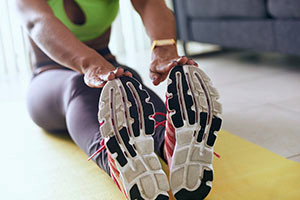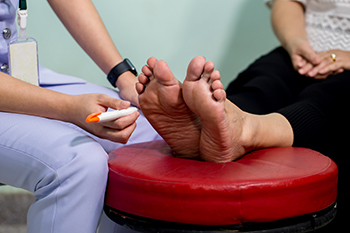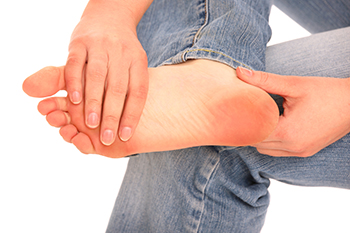Connect With Us
Blog
Items filtered by date: July 2023
Methods That Can Help to Prevent Running Injuries

Research has shown that runners incur more injuries than other athletes. This can happen from a lack of stretching, in addition to the repetitive force that accompanies running. There are methods to prevent running injuries that can be applied to any type of running, ranging from running in several marathons to jogging on the weekend. It is beneficial to increase mileage and speed gradually, which can give the muscles and ligaments adequate time to adjust. Additionally, drinking enough water is important in preventing dehydration, especially after running is completed. It is helpful to consume sources of protein and carbohydrates, which can repair the muscles. It is important to stretch the legs properly before and after running, which is needed to prevent running injuries. If you would like to learn about foot-strengthening stretches that can help to prevent running injuries, it is suggested that you confer with a podiatrist who can provide you with useful information.
All runners should take extra precaution when trying to avoid injury. If you have any concerns about your feet, contact Paul Hutchison, DPM of Hutchison Foot Clinic. Our doctor will treat your foot and ankle needs.
How to Prevent Running Injuries
There are a lot of mistakes a runner can make prior to a workout that can induce injury. A lot of athletes tend to overstretch before running, instead of saving those workouts for a post-run routine. Deep lunges and hand-to-toe hamstring pulls should be performed after a workout instead of during a warmup. Another common mistake is jumping into an intense routine before your body is physically prepared for it. You should try to ease your way into long-distance running instead of forcing yourself to rush into it.
More Tips for Preventing Injury
- Incorporate Strength Training into Workouts - This will help improve the body’s overall athleticism
- Improve and Maintain Your Flexibility – Stretching everyday will help improve overall performance
- “Warm Up” Before Running and “Cool Down” Afterward – A warm up of 5-10 minutes helps get rid of lactic acid in the muscles and prevents delayed muscle soreness
- Cross-Training is Crucial
- Wear Proper Running Shoes
- Have a Formal Gait Analysis – Poor biomechanics can easily cause injury
If you have any questions, please feel free to contact our office located in Memphis, TN . We offer the newest diagnostic and treatment technologies for all your foot care needs.
How Peripheral Neuropathy Affects the Feet

Peripheral neuropathy indicates damage to nerves that serve the extremities, and it commonly affects the lower limbs, feet, and toes. This condition is often caused as a result of sustaining high levels of blood sugar and is common among diabetics. Symptoms include sensations of numbness and tingling in the feet and toes, mainly because the nerves that serve those areas are unable to send messages to the extremities. Other symptoms are loss of the ability to feel pain and changes in temperature. This puts a patient in danger of ignoring cuts and sores that develop on the feet. It also means they cannot tell if they are walking on an extremely hot surface that could burn their feet. Burning and shooting pains are common in people who have developed peripheral neuropathy, and these frequently occur during the night. In addition, the skin is overly sensitive to touch, and even having a sheet over the lower extremities can cause discomfort. If you believe you may have developed peripheral neuropathy, it is suggested that you make an appointment with a podiatrist who can properly test for this condition and offer treatment options.
Neuropathy
Neuropathy can be a potentially serious condition, especially if it is left undiagnosed. If you have any concerns that you may be experiencing nerve loss in your feet, consult with Paul Hutchison, DPM from Hutchison Foot Clinic. Our doctor will assess your condition and provide you with quality foot and ankle treatment for neuropathy.
What Is Neuropathy?
Neuropathy is a condition that leads to damage to the nerves in the body. Peripheral neuropathy, or neuropathy that affects your peripheral nervous system, usually occurs in the feet. Neuropathy can be triggered by a number of different causes. Such causes include diabetes, infections, cancers, disorders, and toxic substances.
Symptoms of Neuropathy Include:
- Numbness
- Sensation loss
- Prickling and tingling sensations
- Throbbing, freezing, burning pains
- Muscle weakness
Those with diabetes are at serious risk due to being unable to feel an ulcer on their feet. Diabetics usually also suffer from poor blood circulation. This can lead to the wound not healing, infections occurring, and the limb may have to be amputated.
Treatment
To treat neuropathy in the foot, podiatrists will first diagnose the cause of the neuropathy. Figuring out the underlying cause of the neuropathy will allow the podiatrist to prescribe the best treatment, whether it be caused by diabetes, toxic substance exposure, infection, etc. If the nerve has not died, then it’s possible that sensation may be able to return to the foot.
Pain medication may be issued for pain. Electrical nerve stimulation can be used to stimulate nerves. If the neuropathy is caused from pressure on the nerves, then surgery may be necessary.
If you have any questions, please feel free to contact our office located in Memphis, TN . We offer the newest diagnostic and treatment technologies for all your foot care needs.
Fixing Foot Pain

Foot pain is common. If your feet hurt and it is not from an injury you know you have sustained, it is important to try to get to the bottom of what might be going on. Your feet may simply feel sore and tired from everyday life. If this is so, it can help to rest, soak, and massage them. Foot massages can help to reduce tension and pain, as well as improve circulation and stimulate muscles. As part of a good foot care regimen, it is beneficial to examine your feet each day to see if any injuries have developed. Diabetic patients need to be particularly diligent when inspecting their feet as many of those with diabetes suffer from peripheral neuropathy. This condition can make it difficult to feel pain, therefore, sores and cuts may not be unnoticed. If your feet hurt and the pain continues or if you notice inflammation or sores, it is suggested that you visit a podiatrist for an examination and treatment.
Foot Pain
Foot pain can be extremely painful and debilitating. If you have a foot pain, consult with Paul Hutchison, DPM from Hutchison Foot Clinic. Our doctor will assess your condition and provide you with quality foot and ankle treatment.
Causes
Foot pain is a very broad condition that could be caused by one or more ailments. The most common include:
- Bunions
- Hammertoes
- Plantar Fasciitis
- Bone Spurs
- Corns
- Tarsal Tunnel Syndrome
- Ingrown Toenails
- Arthritis (such as Gout, Rheumatoid, and Osteoarthritis)
- Flat Feet
- Injury (from stress fractures, broken toe, foot, ankle, Achilles tendon ruptures, and sprains)
- And more
Diagnosis
To figure out the cause of foot pain, podiatrists utilize several different methods. This can range from simple visual inspections and sensation tests to X-rays and MRI scans. Prior medical history, family medical history, and any recent physical traumatic events will all be taken into consideration for a proper diagnosis.
Treatment
Treatment depends upon the cause of the foot pain. Whether it is resting, staying off the foot, or having surgery; podiatrists have a number of treatment options available for foot pain.
If you have any questions, please feel free to contact our office located in Memphis, TN . We offer the newest diagnostic and treatment technologies for all your foot care needs.
